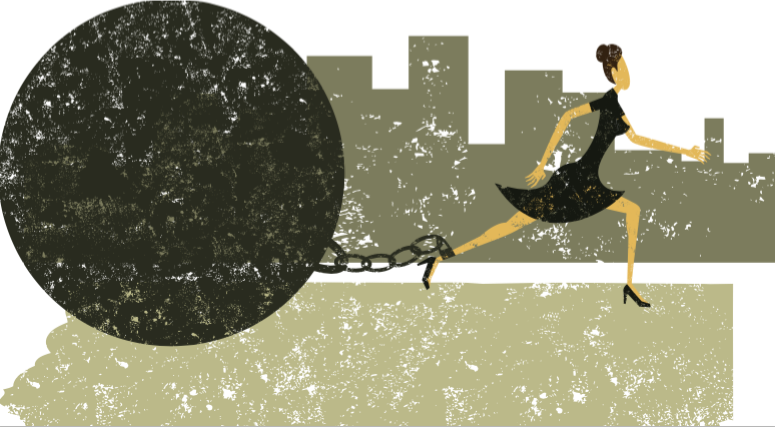At the heart of one of our most joyous holidays lies a dark, open secret that hides the suffering of invisible women in our community. On March 9, two special events occurred: Ta’anit Esther (the Fast of Esther), leading the way into Purim celebrations, and also International Agunah Day, drawing attention to hidden and silenced women.
These days are appropriately linked. According to the Talmud, biblical heroine Esther was forced into an unwanted marriage to King Achashverosh (Ahasuerus). Esther, whose name is related to the Hebrew word hester, meaning “hidden,” was silenced. Like Esther, agunot (women anchored to unwanted marriages) today don’t control their own destinies. They are subject to the whims of a controlling spouse in challenging marriages, and they fear for their lives. Like Esther, the voices of agunot have been hidden and silenced. So we use Ta’anit Esther to publicize the plight of agunot, women refused a get (Jewish divorce decree) by their recalcitrant husbands. Ultimately, however, Queen Esther saved the Jewish people. The question remains: who will save Jewish women from the abuse of get-refusal?

The lack of support focusing solely on the issues of Jewish women who experience domestic abuse, of which get-refusal is a unique and sinister type, is a blight on our community. Make no mistake about it: the lack of an organization dedicated solely to this cause does not mean the need isn’t there. There are agunot in Canada today, and they need our help.
My research has affirmed that while there is more shame and fewer resources in religious communities (of all faiths), the rate of violence is the same as in non-religious communities (of all faiths). Moreover, research shows that every case of get-refusal is preceded by other forms of domestic abuse, with the refusal of a get acting as the final blow.
For some men, it is the final vestige of control. At times, husbands attempt to leverage the get in exchange for civil concessions far beyond those they might be entitled to, turning the religious legal requirement into a civil bargaining chip. Some women even expressed that get-refusal is harder to endure than physical violence because “once you remove yourself from the environment of physical abuse, it stops; but the abuse of get-refusal follows you everywhere.”
Our community in Canada is not immune. Just because you may not see it doesn’t mean it isn’t here. Even after my years of doctoral and communal work, I am sad and disappointed, but not surprised, to report that not much has changed. There remains much complacency, indifference, denial and silence, and so I write again on this annual day of commemoration.
Don’t get me wrong, it’s not all status quo. There have been noteworthy legal changes over the years to our civil laws. There have been many talmudic and halakhic remedies suggested over centuries, but to date, neither the religious nor civil legal routes have been effective (especially in Ontario).
There are numerous reasons for this, none of which change the bottom line: get-refusal, extortion and abuse exist (even if you can’t see it). The “cure du jour,” the halakhic prenuptial agreement, in the words of Rabbi Mordechai Willig, its primary rabbinic author, proponent and prolific rabbinic authority, “is not effective in all cases” in the United States. Meanwhile, it is not effective in any cases in Canada.
Rabbi Daniel Korobkin, senior rabbi of Beth Avraham Yoseph of Toronto (BAYT), one of the largest Orthodox synagogues in North America, is the current president of the Rabbinical Council of America, which passed a resolution in 2016 “requiring the use of prenuptial agreements” for its member rabbis when officiating marriages. A handful of other Canadian rabbis have also signed on – a nice, but largely symbolic gesture considering the number of rabbis in those communities and the fact that no members of the Toronto beit din will sign on (as they have made explicitly clear in these pages).
Yet, both legally (due to the ban on religious arbitration) and religiously (because the Toronto beit din has repeatedly come out against the prenup, despite the halakhic approval of Rabbi Willig and other world-renowned rabbis), couples signing these prenups will not be able to use them in Canada and will not be protected if they are refused a get – which, statistics show, some of them will be. By signing prenups, couples are simply making a social statement, not a binding contract in either legal system at present. They should continue to make this important social statement, but with the understanding that they have no legal protections as a result.
So what can we do, and how can we go about making a real change?
Firstly, we must understand where the battle needs to be fought. The “problem” is not Jewish laws surrounding divorce – as asymmetrical as they may be. After all, the vast majority of Jewish divorces do not result in the abuse of get-refusal. In fact, when a get is proffered, the divorce is more efficient and economical than compared to our civil system. Moreover, research shows that the women refused a get do not see religion or Jewish law as the problem!
Secondly, we must clearly reframe get-refusal and call it what it is: a vicious form of abuse caused by abusive individuals. The notion of negotiating or extorting the get is a relatively new phenomenon in our long history, gaining traction only in the last 50 or so years, meaning it was a learned tactic that has somehow become dangerously hegemonic.
Thirdly, we cannot sit passively and let a husband’s refusal to grant a get be normatively recognized as his free will, rather than a gross domestic abuse violation that controls the legal, halakhic, psychological, social, and marital/sexual destiny of his spouse. We must combat manipulation or subversion of religion by recalcitrant husbands who may become more powerful than the entire community and its leadership.
Unfortunately, we have been tolerating rather than remedying the phenomenon in our communities. This is not moral or halakhic. In Chapter 16 of Deuteronomy, the Torah teaches, Tzedek, tzedek tirdof (“Justice, justice you shall pursue”). The status quo is simply unacceptable. We must challenge the notion that a get is negotiable.
Moreover, it is not the persistence of the abuse of get-refusal that is in and of itself noteworthy. Abuse, power and violence, after all, are normative characteristics of conjugal relationships and will be deployed in all relationships, Jewish or not. There are bad people. Some of them are men who happen to be religious, and these bad individuals will use whatever tools they have at their disposal to bolster themselves in their abuse – sometimes that includes religion. This is certainly prevalent in many other faiths.
What is noteworthy is the reluctance among our community and leadership to mend the gash in the fabric of our own society. In other words, my research has shown that the abuse (including get-refusal) is actually normative to some extent, but it is how the abuse is being addressed (or not addressed, more accurately) that is non-normative, particularly in Toronto. It is shameful that we allow this to happen.
After identifying get-refusal as abuse, placing the problem on those who refuse a get and deciding to finally no longer permit this behaviour, here are my top three calls to action:
1) We must unlearn that refusing a get or even negotiating for a get is acceptable behaviour upon the breakdown of a marriage. Women should not have to leverage their freedom simply in order to level the playing field. The get must be separate from, prior to and without the conditions of regular divorce negotiations. We must teach this to our children, especially our sons. We must speak from pulpits, give classes and homework, write and talk about this amongst our friends. We must re-educate our community.
2) We must insist that all batei din (rabbinic courts), including the Toronto beit din, employ the most basic, uncontested and traditional tools they have at their disposal. They must follow the halakhic protocol all legitimate batei din follow stemming from the harkhakot (distancing mechanisms) of 12th-century French rabbi Rabbeinu Tam – they must issue hazmanot (summonses) and seruvim (orders of contempt) in order for communal sanctions known as herem (excommunication) to exert pressure on recalcitrant spouses, including shaming, “e-shaming” and ostracism.
Disturbingly, a few years ago, Rabbi Asher Vale, who writes a column in this paper, said at a public event that the Toronto beit din doesn’t take these measures so as to prevent potential embarrassment of the beit din if someone was to ignore the orders. The way I see it, the fact that the court doesn’t issue these orders is the embarrassment. Not recognizing our hidden and silenced women is shameful. These mechanisms would work well in our Canadian communities. They would actually empower the beit din and, most importantly, would send a message to communities at large, and abusive men in particular, that there will be consequences for their inaction.
We also must insist that batei din work efficiently – not delaying or postponing divorce proceedings, not insisting on the potential for shalom bayit (peace in the home) where there is abuse present – and transparently (after all, they work for the entire community, we ought to know how they do so).
To illustrate this point, I look to one of the most notorious get-refusers in the world. There is a man who has been walking around freely for over 13 years, living his life in the United States, and he has remarried, while his previous wife is still chained to him, as he has refused to give her a get. A civil divorce was issued in 2007, but if you’ve been following this notorious saga, you know he has wielded even more power than legitimate American batei din and the Chief Rabbinate of Israel. So far, no one has been able to put an end to this get-refuser’s abuse. Some of his family members, who fully support him, live in Toronto. I learned this by coincidence – or divine intervention – a few years ago.
I can’t help thinking that it is incumbent upon all of us to “lean in” to the harkhakot of Rabbeinu Tam so that we not stand idly by, supporting the abuse that is get-refusal – the abuse that is hiding in our midst, the abuse that, just because we may not see it, doesn’t mean it isn’t there.
3) Support agunot and their children, make them feel welcome in the community and at synagogue. Invite them over, call them up, help them out, be inclusive.
Perhaps just as importantly, do the opposite for the recalcitrant spouse. Do not welcome them in synagogues, do not give them kibbudim (honours) there. Do not do business with them. Do not invite them to your homes or simchas. Do not include them in your community in any way. They must understand that there are consequences to their recalcitrance.
It is a sad state of affairs that women refused a get in Toronto have no support. Get-refusal should and can be solved using both legal and social methods, yet our community is refusing not only to look outside itself for remedies, but is refusing to look inside itself and take responsibility, thereby enabling this injustice in our midst to endure.
As you celebrate Purim, with many dressing up to retell the story of Esther, remember that behind those masks may be an abused woman who is hidden and silenced. Just because you can’t see it doesn’t mean it isn’t there.
Author

Yael Machtinger is a professor of law and society at the John Jay College of Criminal Justice in New York and studies intersections between law and religion. She is currently under contract for a book on the first comprehensive, qualitative study of Jewish divorce-refusal and the first comparative study between Toronto and New York. She can be contacted at [email protected].
View all posts








